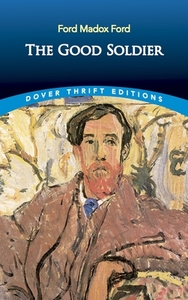Take a photo of a barcode or cover
With one of the great opening lines "This is the saddest story I've ever heard" this is a complex story of deceit and incompatibility perhaps summed up by a paragraph towards the end "Why can't people have what they want? The things were all there to content everybody; yet everybody has the wrong thing. Perhaps you can make head or tail of it; it is beyond me". Indeed.
beautifully done and way ahead of its time.
Very creepy book, it felt a bit like the Little Stranger, some outsider becoming obsessed with a way of life they were excluded from. The narrator is an American, who seems content to do nothing with his life. He is married to a woman, but they are never intimate, because of her heart condition, so he has been her nurse and carer for the past decade or so. They come to a spa in Europe and meet an English couple, the man being the good soldier of the title. The english husband and american wife begin an affair, supposedly unknown to the narrator. But the narrator is so unreliable it's hard to know what he knew at what point. The english husband is a serial adulterer and his wife is more concerned with appearances and getting the finances in order. Everyone is terrible in the book, but the atmosphere and how the information is released is different.
reflective
medium-paced
I found it (a) confusing as the truth only leaks out little by little (a device that succeeds in keeping the tension up); and (b) irritating because the people are so stupid – you keep saying “don’t do that, speak up!”. If only they had been more natural and instinctive, a bit more hippyish, things would have turned out ok. But, like Parade’s End, Ford is portraying English upper-class stiff-upper-lippism. The narrator is very stupid too – he idolises Edward Ashburnham as a good soldier, and compassionate landowner, totally ignoring his fatal weakness of falling in love with many, or several, women. Ford was a Catholic of course. Some of the contemporary American reviews are comical in their disgust.
He situates the house that Florence wanted to be mistress of near Fordingbridge at ‘Branshaw Teleragh’. There actually is a spot called Bramshaw Telegraph, on top of a hill in the New Forest where there was an Admiralty Shutter Telegraph station. If not a simple typo, how weird of him to swap the odd letter to give a pseudo-Irish place name quite out of place in Hampshire.
He situates the house that Florence wanted to be mistress of near Fordingbridge at ‘Branshaw Teleragh’. There actually is a spot called Bramshaw Telegraph, on top of a hill in the New Forest where there was an Admiralty Shutter Telegraph station. If not a simple typo, how weird of him to swap the odd letter to give a pseudo-Irish place name quite out of place in Hampshire.
The story of two highly dysfunctional marriages told by a highly unreliable narrator who is part of the bleak and torturous drama. It exposes the consequences of late-Victorian repression and sentimentalism on individuals attempting to conform to what makes someone a “good” person. The deliberately rambling structure (by an often-misogynistic narrator) belies an intricate unravelling of the value systems at play in polite English society in the years before World War One.
Absolutely insane. One of the most slimy, insidious narrators. So fun. Made me feel crazy.
Breezed through it in a day like it was a thriller.
Breezed through it in a day like it was a thriller.
Lesser modernism. Begins with that great confused, reticent narrative voice of the time (mainly Conrad, but Joyce and Faulkner also come to mind) but ends up having little to say.
challenging
dark
mysterious
tense
slow-paced
Plot or Character Driven:
Character
Strong character development:
Yes
Loveable characters:
No
Diverse cast of characters:
No
Flaws of characters a main focus:
Yes
Stream of consciousness writing style was good but definitely more of a challenging read if you don’t know much about the social norms of early 1900s England



